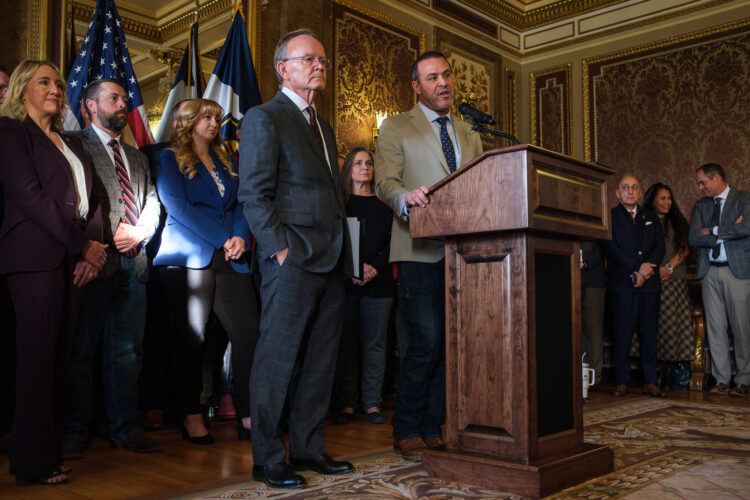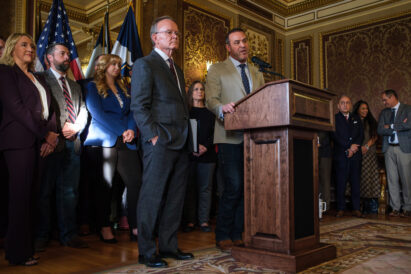In redistricting fight, Utah Republican lawmakers will appeal to Utah Supreme Court
GOP legislative leaders plan to appeal the court-ordered map and convene a special session Dec. 9 to possibly weigh a constitutional amendment or delay candidate filing deadlines.

Photo by Marco Lozzi for Utah News Dispatch
Senate President Stuart Adams, R-Layton, and House Speaker Mike Schultz, R-Hooper, talk to reporters during a press conference at the Utah Capitol in Salt Lake City on Tuesday, Nov. 25, 2025.Calling Utah’s new court-ordered congressional map that creates a Democratic-leaning district the “most gerrymandered map in the history of the state of Utah,” Utah’s Republican legislators are digging in their fight against the judge’s ruling.
House Speaker Mike Schultz, R-Hooper, and Senate President Stuart Adams, R-Layton, held a news conference at the Utah Capitol on Tuesday — with dozens of GOP legislators from both the House and Senate at their backs — to announce they plan to appeal 3rd District Judge Dianna Gibson’s decision to the Utah Supreme Court.
Additionally, the legislative leaders announced they are gearing up for a special session expected to be held Dec. 9 to consider their legislative options to ensure the state’s election system has “clarity” ahead of the 2026 election.
The agenda for that special session is still being decided, legislative leaders said. But lawmakers may consider putting a constitutional amendment on the 2026 ballot to ask voters whether to “clarify” when lawmakers can make changes to laws enacted by ballot initiatives.
Lawmakers may also weigh delaying candidate filing deadlines in order to allow more time for a different congressional map to be enacted for the 2026 election — but the special session’s agenda hasn’t yet been finalized, according to Gov. Spencer Cox, who will be issuing the call.
“It’s deeply concerning that an unelected judge overrode the Utah Constitution … and silenced Utahns by imposing a map without public input,” Adams said, arguing that the map she picked, drawn by the plaintiffs in a redistricting lawsuit against the state, didn’t follow a public process.
Democrats in the Utah House and Senate issued a joint statement after Tuesday’s press conference condemning the call for a special session next month, saying “we continue to believe that Judge Gibson’s ruling should be respected.”
“The Legislature’s map failed to comply with Proposition 4, and the court selected the map that did meet the law’s requirements,” House and Senate Democrats said. “It is fiscally irresponsible to use tax payer dollars to fight this legal battle, which undermines the will of Utah voters. Utahns deserve to know their voices matter and their representatives do not choose their voters.”
Utah’s Republican lawmakers continue to argue that Gibson violated the Utah Constitution when she picked a map that wasn’t adopted by the Utah Legislature, which GOP lawmakers continue to argue — despite multiple court rulings against them in the state’s yearslong redistricting court battle — has the sole authority to redistrict.
Plaintiffs in the state’s redistricting lawsuit have pointed to court proceedings in other states and argued the courts have a duty to intervene and select “remedial” maps when they determine lawmakers have failed to follow the law. But Republican lawmakers contend the judge should have gone another route, like asking the Legislature to vote on an alternative, rather than picking a map and sidelining the Legislature.
Now, Adams and Schultz said county clerks and candidates are facing “chaos” and confusion over the new map’s boundaries.
“Utahns deserve a process that’s stable, transparent and accountable. One in which decisions are made with respect to the constitutional roles of each branch of government,” Adams said. “Unfortunately, the courts have created confusion for our communities, candidates and for Utahns across the state.”
The lawsuit’s plaintiffs and Utah Democrats have celebrated the map selected by Gibson as one that most closely follows Proposition 4’s neutral map-drawing criteria and reflects Utah’s “political geography” with a district that best represents Utah’s urban core in Salt Lake County. But the map’s critics argue it created four uncompetitive districts that lead to skewed partisan results in a state that’s dominated by a statewide majority of Republican voters.
“By design or by default, Judge Gibson has authorized the most partisan and thus the most gerrymandered map in the history of the state,” Adams said. “I assume she didn’t intend or set out to gerrymander herself. But anyone who looks at the donut hole map sees very clearly it’s gerrymandered. Yes, Judge Gibson gave us a gerrymandered map.”
“That’s why,” Adams continued, “we’re appealing to the Utah Supreme Court and preparing the appeal right now.”
As of Tuesday morning, Gibson hadn’t yet issued her final legal analysis and ruling on a request from the Legislature’s attorneys to push pause on the map she selected earlier this month. Adams said attorneys are waiting for that final ruling to be issued before submitting their appeal to the Utah Supreme Court.
“We urge the district court to issue its final ruling quickly so we can use all the options and tools available to us as we appeal that decision to the Supreme Court,” Adams said.
Thursday’s press conference was the latest show of force from Utah’s Republican-controlled Legislature as conservative lawmakers continue to protest the court-ordered redistricting process meant to “remedy” the state’s 2021 congressional map, which Gibson in an August ruling determined was the result of an unconstitutional process.
That year, the Utah Legislature adopted a map with four safe Republican congressional districts after it undid a 2018 voter-approved ballot initiative known as Proposition 4, which was meant to implement an independent redistricting process. That prompted pro-democracy groups including the League of Women Voters of Utah and Mormon Women for Ethical Government to sue, alleging the map was a “blatant gerrymander” and that lawmakers violated Utahns’ right to alter and reform their form of government through a ballot initiative.
Gibson initially dismissed that lawsuit, but in a ruling last summer, the Utah Supreme Court sent the case back to her courtroom, determining in a unanimous opinion that she “erred.” That opinion made clear that the Utah Legislature’s power to change “government reform” ballot initiatives has limits.



